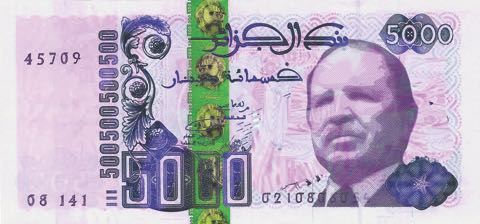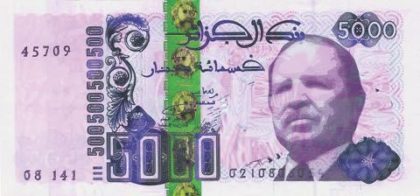
Tough Days Ahead for Algeria’s Currency
 The health of Algeria’s currency, the dinar, has always been measured against oil prices. The end of the era of expensive oil in late 2014 has sent the dinar dwindling in value as Algeria continues to squander its oil mantra avoiding painful reforms to diversify its economy.
The health of Algeria’s currency, the dinar, has always been measured against oil prices. The end of the era of expensive oil in late 2014 has sent the dinar dwindling in value as Algeria continues to squander its oil mantra avoiding painful reforms to diversify its economy.
Since the beginning of this year, the dinar lost 16.3 percent of its value against the Euro compared to the same period in 2017.
The dinar’s exchange rate against hard currencies moved from 79.82 dinars per dollar and 106,9 dinars per Euro four years ago, to 118,14 dinars per dollar and 137,07 dinars per Euro four days ago. This means the dinar lost 48% of its value in four years.
The depreciation of the dinar reflects the risky dependence of the Algerian economy on a single commodity as oil and gas represent 95% of the country’s exports.
The fall of the dinar aggravates Algeria’s trade deficit, which deepened about 16 percent in the first five months of the year.
This causes high inflation once imports are on the local market. Inflation has also been exacerbated by the government’s money printing policy further eroding the dinar’s fragile stability.
A weak dinar is also harming the country’s decreasing foreign exchange reserves estimated at less than $100 million currently.
As it heads straight to insolvency, Algeria insists on shunning foreign debt as it resorts to unconventional measures involving the Central Bank money printing to delay an impending bankruptcy in the absence of genuine reforms.
What further complicates future prospects for the dinar are the measures taken by the government to cover the budget deficit.
Algerian authorities further complicated the recovery of the dinar through their five-year plan to reduce Algeria’s ballooning budget deficit by borrowing directly from the central bank.
Such time-buying measures known as “helicopter money” describe a situation in which the Central Bank covers the state’s budget deficit by printing more money and injecting it directly into the Treasury, instead of borrowing from abroad.
The dinar will continue to be prey to the volatility of oil prices in international markets as long as the country shuns genuine reforms. The prospects become even bleaker when considering the opacity shrouding the Algerian regime at a context of succession crisis.
